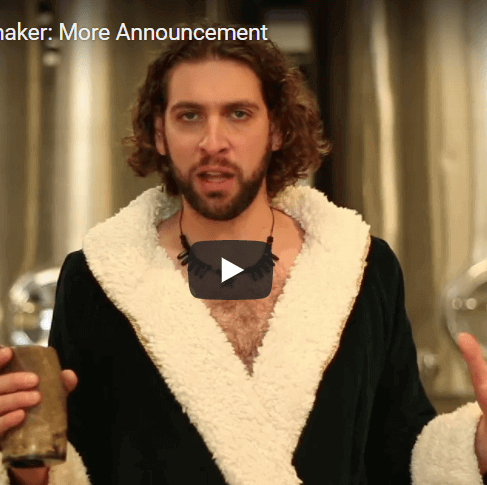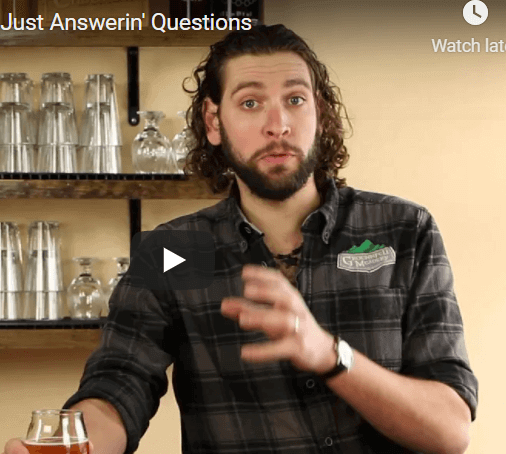TRANSCRIPT
Next episode is the two-year anniversary of this show. It aligns with feast week for Colchester's Mead Hall. I am so excited that I have other Ricky currently over there building things, but I asked him to loan me something for this cold open. I want you to see this saw we got for us. Did you know that they made Ricky-sized saws?
Welcome to Ask the Meadmaker, where I, Ricky the Meadmaker, answer your questions about mead making, mead drinking, mead brewing, and really any question you're willing to send to me.
Our first question this week comes from Burchaska, who is having some cloudiness issues over in Poland, and not knowing much about the weather in Poland, I don't know whether this is unusual or not. That's weird. I don't usually make puns. I must be in a jocular mood because of all the construction.
Well anyway, her cloudiness issues are in her mead. She says she has a mead that's about two years old, and it's still cloudy. Is it ever going to settle out? The bad news is at two years, probably not. So, she wants to know if she can use finings, something like bentonite, or if she'd have to filter. Not knowing what is causing that cloudiness, and the fact that it's still in solution after two years, I'm afraid filtering may be called for if you're really that worried about it.
Jeff sent us a very interesting question which may be a little too complex to answer in its entirety on air, but there is a simple answer to it. His question is, why does fermenting at different temperatures produce different flavors? The simple answer is, you are dealing with yeast and they have a lot of different metabolic processes going on. Most of them produce carbon dioxide and ethanol alcohol in your beverage. But there are lots of other things that are being produced. Phenols, chlorophenols in some cases, aldehydes, and when you change the temperature, like in the human body and a lot of other things, you help boost or slow down certain metabolic activities, preferencing certain compounds.
One of my favorite things is when I get a question where the person guesses the answer to it, but sends it in so that I can answer it in the bare hope that maybe I'll give them a different answer. Jeff, in the same email, also asked me, "All of my mead is flat and I put in carb tabs. I didn't add any yeast. Are you telling me that I have to pour all of my mead back into a bucket? Add more yeast or a different yeast or maybe more sugar and rebuttal everything?" The answer is, Jeff, if you wanted to have bubbles, and you've sat on it for a year, that may be all you can do.
Since I answered that question six seconds ago, Ricky over there just interrupted his work and yelled over "Or buy a damn kegging system and force carbonate it for once!" He and I are in complete agreement.
Brandon B. wants to know if we purchase our honey or if we have our own apiary. Now, I think I've talked about this before. We buy all of our honey from one beekeeper up the road, but I don't know that I really emphasize the fact that if I were to have my own apiary, not only would it be a whole Groennfell-Meadery-size business on top of Groennfell Meadery, it would be like a brewery trying to grow all its own grain. I am unbelievably impressed by the meadmakers that are able to do it, but it is too much for me. It's too much for all of me.
Our last question this week I get more or less every single time I am open for business or out at an event, or hanging out with my distributor, or really at home, by email, by phone call. When is Groennfell Meadery coming out with new products? Well, the good news is, I will be brewing special products for Colchester's Mead Hall that you'll be able to get here. I think the question all these people are asking us, when are they going to be able to drink Groennfell's new hit products around the state? And the answer is, we're transitioning to mostly cans, but the problem is the United States, the entire country, has sort of run out of 16-ounce can manufacturers, so as soon as I can figure out how to get packaging, my new products will be coming to market.
That's our last question of the week. I just need to send it over to Ricky with our word of the week. Ricky?
Oh, thank you, Ricky. This week's word of the week is beer gas. Beer gas is a combination of nitrogen and carbon dioxide. It's used for pushing stouts and some other beverages, and we're going to be installing some in Colchester's Mead Hall. It's really cool because it obeys the laws of physics, but it doesn't seem like it does.
Beer gas. It's our Word of the Week and the end of our show. You know the best thing of all? I'm not even building anything right now. I just love this saw so much. See you guys in two weeks.




